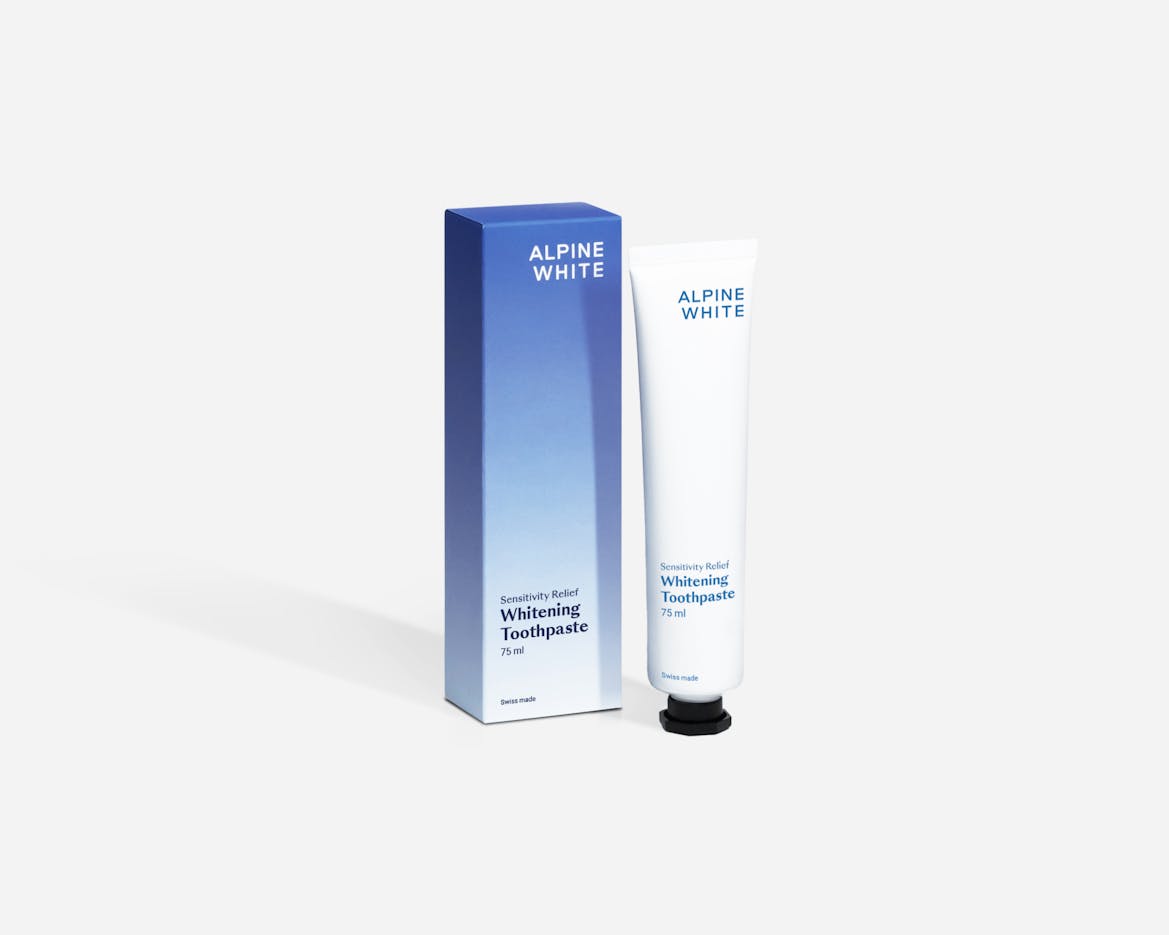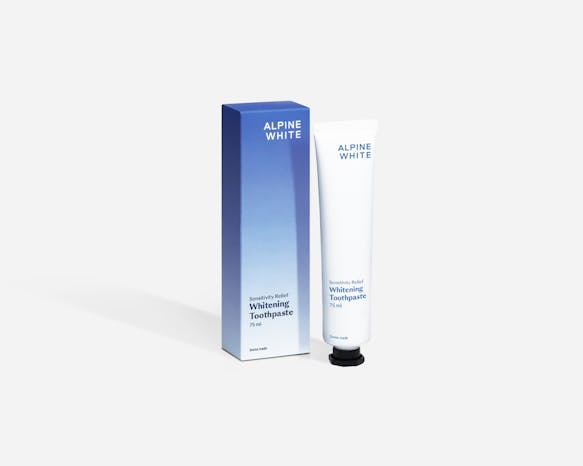Focus on the interdental papilla
The interdental papilla is crucial from both an aesthetic and medical perspective. Aesthetically, it helps to avoid black triangles and unsightly gaps between the teeth, which makes for a beautiful smile. Medically, it acts as a barrier against bacterial infections, making it an integral part of oral health. ALPINE WHITE offers specialised dental hygiene treatments and products to help maintain and promote the health of this critical soft tissue. Learn more in this blog post.



What is the interdental papilla?
The interdental papilla, often referred to simply as the papilla, is the part of the gum (gingiva ) that fills the interdental space between adjacent teeth. It is composed of mucogingival tissue and plays a crucial role in dentistry and periodontology. This specialty focuses intensively on the soft tissue that surrounds and supports your teeth. Interdental papillae are aesthetically and functionally important, especially in the anterior teeth and upper jaw. They serve as a contact surface for neighbouring teeth and help distribute chewing forces.
The position of the interdental papilla is very specific and can vary from apical to coronal. The term "apical" refers to the position closer to the root tip of the tooth, while "coronal" refers to the position closer to the crown of the tooth. This variation depends on the position of the enamel-cement interface on the respective neighbouring tooth. The enamel-cement junction is the transition area between the dental cementum covering the root of the tooth and the enamel covering the crown of the tooth.
These papillae are also found in approximal and buccal areas of the mouth. The "proximal" area refers to the contact surfaces where two adjacent teeth meet, while the "buccal" area means the outer surface of the tooth that faces the cheek. In these regions, they play an essential role in keeping the teeth, especially the canines, in a stable position. The canines are important for biting off and crushing food and therefore require a particularly stable anchorage in the jawbone and surrounding soft tissue.
They are also important in many prosthetic applications to restore natural aesthetics and functionality. In dentistry, there are a variety of techniques and procedures for the care and reconstruction of the interdental papilla, which once again highlights the importance of this small but essential tissue.
Why is the interdental papilla important?
Protection against periodontal disease
One of the most important features of the interdental papilla is its role as a natural barrier against periodontal disease. This small area of soft tissue effectively prevents bacteria and food debris from entering the interdental space, which could otherwise be a breeding ground for plaque and gingivitis. The protective mechanism of the interdental papilla is so efficient that its absence or damage can often be an early warning sign of serious periodontal problems.
Aesthetic role
The interdental papilla is not only functionally but also aesthetically immensely important. It fills the space between the anterior teeth in the upper jaw and other adjacent teeth, which prevents the formation of unsightly black triangles. These triangles can make your smile less appealing and are often difficult to fix with cosmetic dentistry or prosthetics. Cosmetic dentistry uses interdental papilla reconstruction techniques to create an aesthetically pleasing and natural-looking smile.
Stability of the contact points
The interdental papilla is not only for protection and aesthetics. It also has a biomechanical role by supporting the stability of the contact points between adjacent teeth. These contact surfaces are important for the distribution of chewing forces and help to avoid excessive pressure on individual teeth. The function of the interdental papilla is particularly useful in the canines, which play a key role in the distribution of chewing forces.
In dentistry, understanding and caring for the interdental papilla is given high priority. With advancing technology and research, more preventive and restorative treatment options are becoming available to ensure the health of this crucial tissue.


Your first aid for sensitive teeth. Whitening for sensitive teeth with Whitening Toothpaste Sensitivity Relief. For gentle daily dental and oral hygiene.
- Relieves tooth hypersensitivity
- Based on our clinically tested Whitening formulation
- Remineralizes the enamel and relieves existing tooth sensitivity
- Antioxidants for healthy gums
- Formulated and produced in Switzerland
Dangers for the interdental papilla
Gingivitis
A significant risk to the health of the interdental papilla is gingivitis, also known as gum inflammation. This is often the precursor to serious periodontal disease and should be considered a serious warning sign. Gingivitis is often caused by poor oral hygiene. The accumulation of plaque and food debris in the interdental space can quickly lead to inflammation that spreads to the interdental papilla. If not treated in time, the inflammation can progress and cause periodontitis. Preventive measures, such as regular dental cleanings and good daily oral hygiene, are therefore essential to maintain the health of the interdental papillae.
Periodontitis
One problem that can seriously compromise the health of the interdental papilla is periodontitis. This inflammatory disease of the gums affects all periodontal soft tissue, including the interdental papilla. The inflammation can cause the papilla height to decrease. This can not only cause aesthetic problems in the anterior region, but also affect the function of the teeth and the general feeling of well-being. In addition, the decrease in the interdental papilla can alter the stability of the contact points between adjacent teeth, which can lead to further complex dental problems. The treatment of periodontitis usually requires a multidisciplinary approach that can range from dental cleaning to surgical intervention to restore the health of the interdental papilla.


For a healthy mouth and beautiful teeth, regular professional teeth cleaning is essential. Our specialists detect early signs of caries and prevent them.
- Personalised dental hygiene
- Gum check & caries control
- Painless cleaning with AIRFLOW
How to protect your interdental papilla
Oral hygiene
Daily oral hygiene is the basis for the health of your interdental papillae and the entire gums. For holistic care, we recommend our Whitening Toothpaste Sensitivity Relief by ALPINE WHITE. This toothpaste has been specially developed not only to make your teeth radiantly white, but also to care for sensitive gums and the surrounding soft tissues. Our products are currently available in Switzerland, Austria, Germany, China and Brazil. So it's easier than ever to have access to quality oral care wherever you are. Don't forget to also thoroughly clean the spaces between your teeth and interdental spaces to keep the interdental papilla in top condition.
Professional teeth cleaning
There are times when even the best daily oral hygiene reaches its limits. For those moments, we at ALPINE WHITE have just the thing for you: our special dental hygiene treatments in our ALPINE WHITE Studios. These treatments go far beyond normal tooth brushing and offer deep care. Our specially trained professionals perform a thorough examination of the condition of the mucosa, the mucosal tissue in your mouth, and give you valuable tips for your daily oral care.
At our ALPINE WHITE Studios, we use state-of-the-art technology and proven methods to ensure that your interdental papillae and all surrounding soft tissue are in optimal condition. So you can smile with confidence, knowing that your oral health is in the best hands.
Restorative and prosthetic procedures
In some cases it may be necessary to reconstruct the interdental papilla by restorative or prosthetic procedures. Implantology and implants offer modern solutions here.


White teeth despite sensitivities. The Whitening Strips Sensitive are mildly concentrated and whiten your teeth sustainably and safely. Suitable for any tooth position.
- Clinically and dentally tested
- Gentle on teeth, peroxide-free and extra mildly formulated
- Whiter teeth after 3 days
Closing words
The interdental papilla may be a small tissue, but it plays a huge role in both the function and aesthetics of your smile. With the right care and attention, it can last a lifetime. At ALPINE WHITE, we pride ourselves on providing products and services that help you get the most out of your smile.


